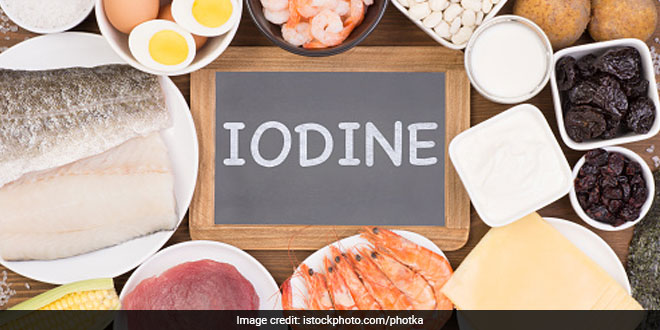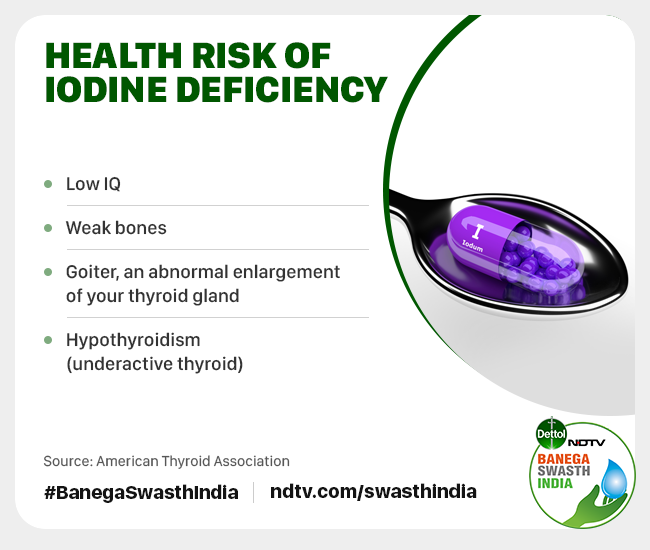Highlights
- Globally, 1·9 billion individuals have inadequate iodine nutrition: Report
- In our country, Iodine is not naturally present in soil and water
- Rich sources of Iodine are milk, egg yolk, sea food, banana: Expert
New Delhi: Iodine is one of the essential dietary mineral that is required in the human body for normal thyroid function, growth, and development. If a person suffers from Iodine deficiency it can lead to a number of health conditions that can even be fatal. According to the American Thyroid Association, “The body does not make iodine, but it is an essential part of your diet. A certain amount of iodine is always required in the human body in order to create a vital chemical known as thyroid hormone.”
The thyroid hormones affect all the cells in the human body, they are also important for the proper development of cells. The thyroid hormones also play a crucial role in increasing the metabolic rate of the body, regulate the growth of long bones and helps in the development of the brain.
However, in India, the entire population is prone to Iodine deficiency because the soil in our part of the world is iodine deficient; especially in the North and North Eastern States. To combat this, common salt in the country was fortified with iodine.
Also Read: Opinion: Childhood Obesity – One Of The Major Public Health Challenges Of The 21st Century
As per the Lancet Report – Prevalence of Iodine Deficiency Worldwide, more than 1·9 billion individuals have inadequate iodine nutrition, of which 285 million are school-aged children. Iodine Deficiency Disorder also constituts the single largest cause of preventable brain damage worldwide leading to learning disabilities and psychomotor impairment, as per Indian Journal of Medical Research. It also states that children living in iodine-deficient areas on an average have lower intelligence quotient (IQ), by as much as 13.5 IQ points compared to children living in iodine-sufficient areas.
To overcome these challenges and make people aware about Iodine Deficiency Disorder and why Iodine so important for the human body, every year, October 21 is marked as World Iodine Deficiency Day and is also known as Global Iodine Deficiency Disorders (IDD) Prevention Day.
How Much Iodine Is Enough?
Iodine is not made in our body; we get our share through the food and water we ingest. According to WHO guidelines, a daily iodine intake of 150 microgram is required to prevent iodine deficiency disorders and this can be achieved by using adequately iodised salt, i.e. salt containing a minimum of 15 parts per million (ppm) of iodine.
Expert Speak
Sharing the sources of Iodine and how one can make sure sufficient intake of this important nutrient, Dr Rupali Datta, Head of Clinical Nutrition HCL Healthcare Executive Committee, Member Indian Dietetic Association said,
One of the main sources of Iodine for us Indians is obviously the salt. In our country, sale of non-iodized salt is banned. The average salt intake in Indian homes range from 5-10g/day, of which, 30% is lost during cooking and 70% is absorbed, providing an average amount of 70µg/day. Apart from salt, milk is another source of iodine with 303µg/litre. Milk is also a great source of protein, vitamins and important minerals like calcium. Half a litre of milk is the minimum quantity needed by adults to obtain the 150µg recommended dietary allowance. Sea Food such as tuna, shrimps, cod and scallops, are also considered excellent sources of iodine. Yolks of eggs are another source of iodine, great for children as they provide another essential “brain nutrient” folate too. Don’t also ignore the intake of your vegetables and fruits – Sweet potato, onion, spinach, banana, and cantaloupe contain iodine.
Highlighting precautions for people with Iodine deficiency in terms of food choices, Dr Datta added that if someone is on supplements or prone to iodine deficiency then he/she should eliminate or reduce the intake of soy, bok choy, broccoli, cabbage, cauliflower, mustard greens, turnip as these foods contains thiocyanates, which interfere with the uptake of iodine by the thyroid gland, so, avoiding these foods is a good strategy to be safe and healthy.
Dr Datta further talked about precautions one should take and said,
Iodine supplementation should only be done under medical supervision. Eating a healthy and varied diet is adequate to meet iodine needs. Complete elimination of iodized salts or substitution with unfortified rock salt is not a good strategy. People with hypertension or heart diseases may reduce their salt intake but ensure that they take other good sources of iodine regularly.

Dr Rupali Datta, Head of Clinical Nutrition HCL Healthcare Executive Committee, Member Indian Dietetic Association highlights the main sources of Iodine for Indians
NDTV – Dettol Banega Swasth India campaign is an extension of the five-year-old Banega Swachh India initiative helmed by Campaign Ambassador Amitabh Bachchan. It aims to spread awareness about critical health issues facing the country. In wake of the current COVID-19 pandemic, the need for WASH (Water, Sanitation and Hygiene) is reaffirmed as handwashing is one of the ways to prevent Coronavirus infection and other diseases. The campaign highlights the importance of nutrition and healthcare for women and children to prevent maternal and child mortality, fight malnutrition, stunting, wasting, anaemia and disease prevention through vaccines. Importance of programmes like Public Distribution System (PDS), Mid-day Meal Scheme, POSHAN Abhiyan and the role of Aganwadis and ASHA workers are also covered. Only a Swachh or clean India where toilets are used and open defecation free (ODF) status achieved as part of the Swachh Bharat Abhiyan launched by Prime Minister Narendra Modi in 2014, can eradicate diseases like diahorrea and become a Swasth or healthy India. The campaign will continue to cover issues like air pollution, waste management, plastic ban, manual scavenging and sanitation workers and menstrual hygiene.
[corona_data_new]




























